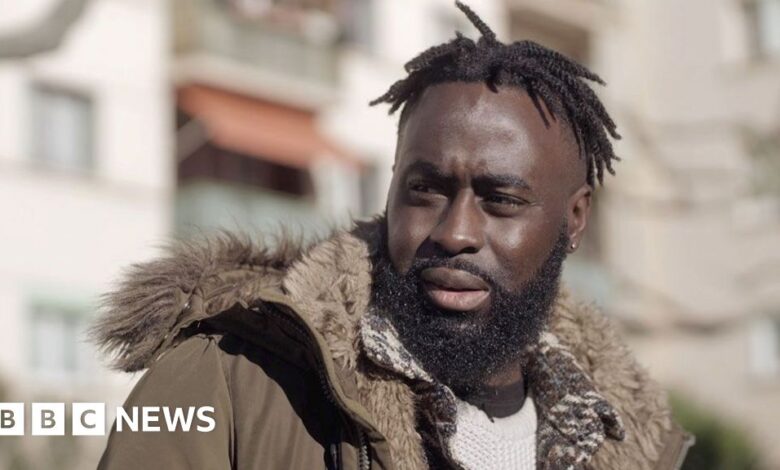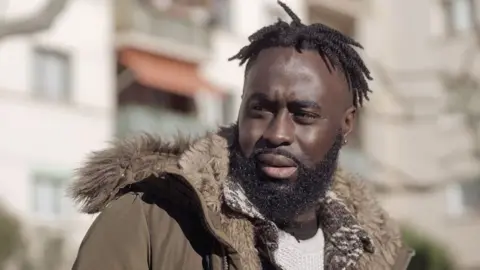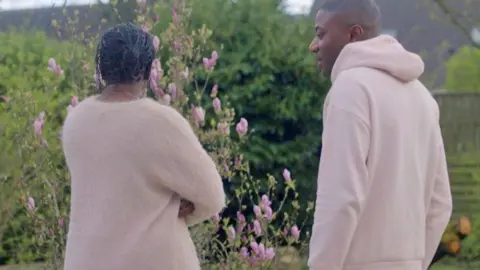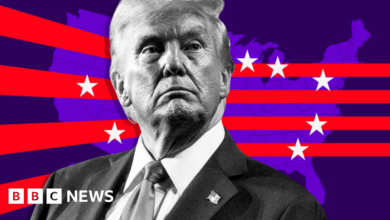Born in France but looking for a future in Africa

 BBC
BBCMenka Gomis was born in France but decided his future lay in Senegal, where his parents were born.
The 39-year-old is part of a growing number of African-Americans leaving France, blaming the rise of racism, discrimination and nationalism.
BBC Africa Eye investigated this phenomenon – dubbed the “silent exodus” – to find out why people like Mr Gomis are so disillusioned with life in France.
The Parisians founded a small travel company offering travel packages, mainly to Africa, aimed at people wanting to reconnect with their ancestral roots and now have an office in Senegal.
“I was born in France. I grew up in France and we know certain realities. There has been a lot of racism. I was 6 years old and I was called the N-word at school. Every day, ” Mr Gomis, who visited the school in the southern port city of Marseille, told BBC World Service.
“I may be French, but I also come from somewhere else.”
Mr. Gomis’s mother moved to France when she was just a child and could not understand his motives for leaving his family and friends to go to Senegal.
“I didn’t just go for this African dream,” he explains, adding that it was a combination of the responsibility he felt towards his homeland and his opportunities.
“Africa is like America at the time of… the gold rush. I think it’s the continent of the future. It’s where there’s everything left to build, everything left to grow.”
The relationship between France and Senegal – a predominantly Muslim country and former French colony that was an important hub in the transatlantic slave trade – is long and complex. .
A recent BBC Africa Eye investigation met migrants in Senegal willing to risk their lives to cross dangerous seas to reach Europe.
Many of them went to France, which, according to France’s Office for the Protection of Refugees and Stateless Persons (OFPRA), had a record number of asylum seekers last year.
In total, about 142,500 people applied and about a third of all requests for protection were accepted.
It is unclear how many people choose to make the reverse journey to Africa because French law prohibits the collection of data on race, religion and ethnicity.
But research shows that highly qualified French citizens of Muslim backgrounds, often the children of immigrants, are quietly emigrating.
People we met told us that attitudes towards immigration are becoming harder in France, with right-wing parties having more influence.
Since their appointment last month, Prime Minister Michel Barnier and Interior Minister Bruno Retailleau have pledged to tackle immigration, both legal and illegal, by promoting changes to domestic and foreign laws. European level.
 AFP
AFPFanta Guirassy has lived in France all her life and runs her own nursing clinic in Villemoble – a suburb of Paris – but she is also planning to move to Senegal, her mother’s birthplace.
“Unfortunately, for several years now in France we have felt less and less safe. It’s embarrassing to say it, but it’s the reality,” said the 34-year-old. told the BBC.
“Being a single mother and having a 15-year-old son means you always have a little knot in your stomach. You’re always scared.”
Her wake-up call came when her son was recently stopped and searched by police while he was chatting with friends on the street.
“As a mother, it’s quite traumatic. You see what happens on TV and you see it happen to other people.”
In June last year, riots broke out across France the shooting death of 17-year-old Nahel Merzouk – a French citizen of Algerian origin was shot by the police.
The incident is still under investigation, but the riots rocked the country and reflected an underlying wave of anger that had been building for years over the treatment of ethnic minorities in France.


A recent survey of black people in France found that 91% of respondents had been victims of racism.
Following the riots, the United Nations High Commissioner for Human Rights (OHCHR) called on France to address “issues of racism in its law enforcement agencies”.
The French Foreign Ministry rejected the criticism, saying: “Any accusations of racism or systematic discrimination by the police in France are completely unfounded. France and its police are resolute fight against racism and all forms of discrimination.”
However, according to statistics from the French Interior Ministry, racist crimes increased by a third last year, with more than 15,000 recorded incidents based on race, religion or ethnicity.
For teacher Audrey Monzemba, who is originally from Congo, such social changes have “become very worrying”.
Early one morning, we walked with her to work through a multicultural and working-class community on the outskirts of Paris.
With her young daughter, she traveled by bus and train, but when she approached the school where she worked, she discreetly removed her headscarf from under the hood of her coat.
In secular France, wearing the headscarf has become a highly controversial issue and 20 years ago it was banned in all public schools – which is part of the reason Ms Monzemba wanted to leave. France to move to Senegal, where she has ties.
“I’m not saying that France isn’t for me. I’m just saying that what I want is to be able to thrive in an environment that respects my faith and values. I want to work without having to leave my job .” my veil,” the 35-year-old said.
A recent survey of more than 1,000 French Muslims who have left France to settle abroad shows that this is a growing trend.
It followed the peak of Islamophobia following the rise of 2015 attack when Islamist gunmen killed 130 people in various locations across Paris.
Olivier Esteves, one of the authors of the French report, You Love It But You Leave It, told the BBC that moral panics around secularism and job discrimination “are the center of this silent flight.
“In the end, this exodus from France constitutes a real brain drain, since it is mainly highly educated French Muslims who decide to leave,” he said.

Take Fatoumata Sylla, 34, whose parents are from Senegal, for example.
“When my father left Africa to come here, he was looking for a better quality of life for his family in Africa. He always told us: ‘Don’t forget your homeland’.”
The travel software developer, who is moving to Senegal next month, said by setting up a business in West Africa she shows she has not forgotten her heritage – although her brother, Abdoul, has also born in Paris, is not. convinced.
“I’m worried about her. I hope she’s okay, but I don’t feel the need to reconnect with anything,” he told the BBC.
“My culture and my family are here. Africa is the continent of our ancestors. But it is not really ours because we are not there.
“I don’t think you’re going to find some ancestral culture or some imaginary Wakanda,” he said, referring to the technologically advanced society featured in the Black Panther movies and comics.
In Dakar, we met Salamata Konte, who founded the travel company with Mr. Gomis, to find out what awaits Franco-French people like her who choose to settle in Senegal.
Ms. Konte swapped her high-paying banking job in Paris for the Senegalese capital.
“When I went to Senegal three years ago, I was shocked to hear them call me ‘French’,” the 35-year-old said.
“I said to myself, ‘Okay, yes, I was born in France, but I’m also Senegalese like you.’ So in the beginning, we have a feeling where we say to ourselves, ‘Damn, I was rejected in France, and now I come here and I’m also rejected here.'”
But her advice is: “You have to come here with humility and that’s what I did.”
Regarding her experience as an entrepreneur, she said it was “really difficult”.
“I often tell people that Senegalese men look down on women. They don’t like to hear that, but I think it’s true.
“It’s hard for them to accept that a woman can become the CEO of a company, that a woman can sometimes give ‘orders’ to certain people, that I, as a woman, can said to a late driver: ‘No, it’s ‘unusual’ for you to be late.’
“I think we have to prove ourselves a little more.”
However, Mr. Gomis is excited as he waits for his Senegalese citizenship.
The travel company is doing well and he says he’s working on his next venture – a dating app for Senegal.
More information from BBC Africa Eye:
 Getty Images/BBC
Getty Images/BBC




